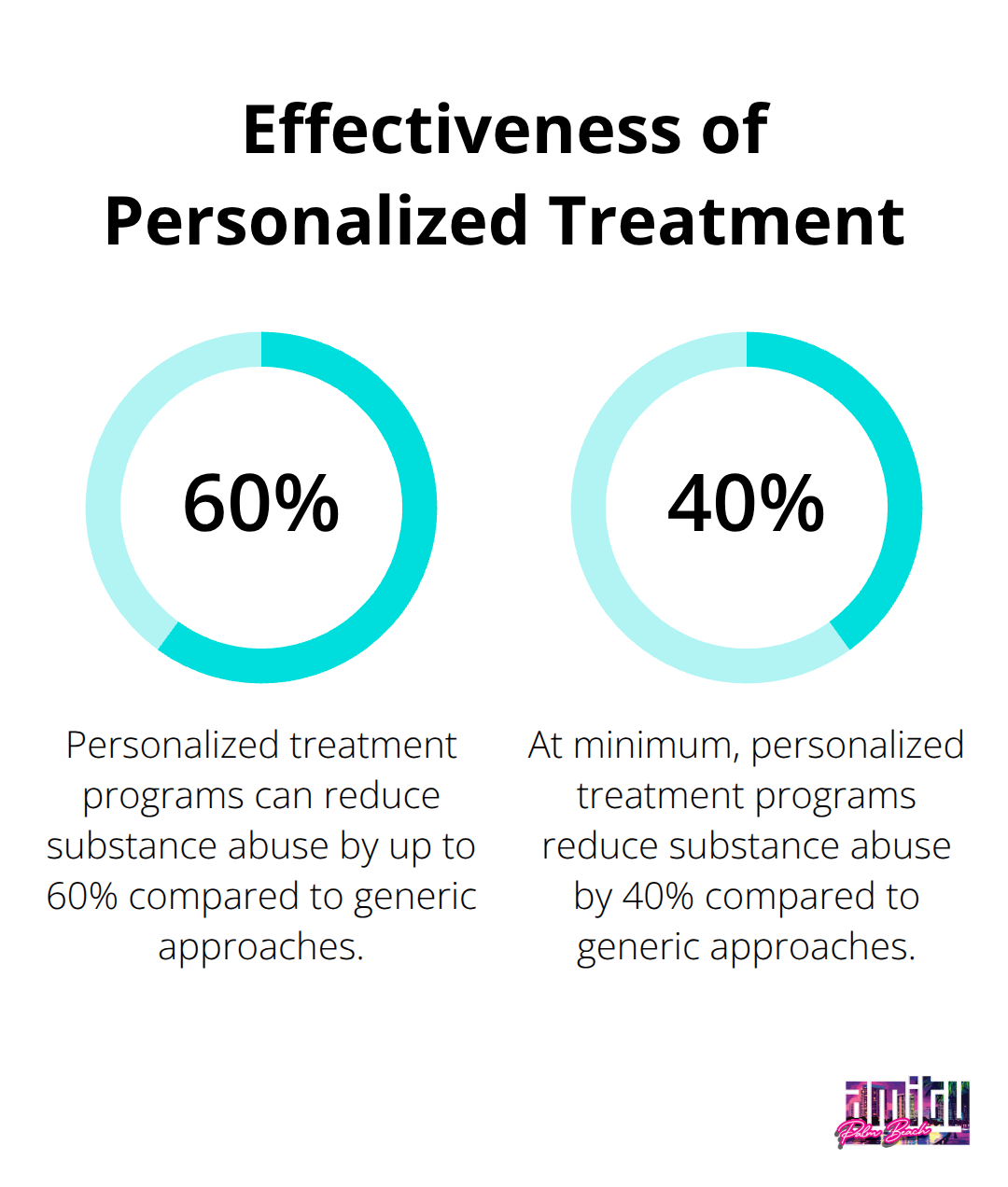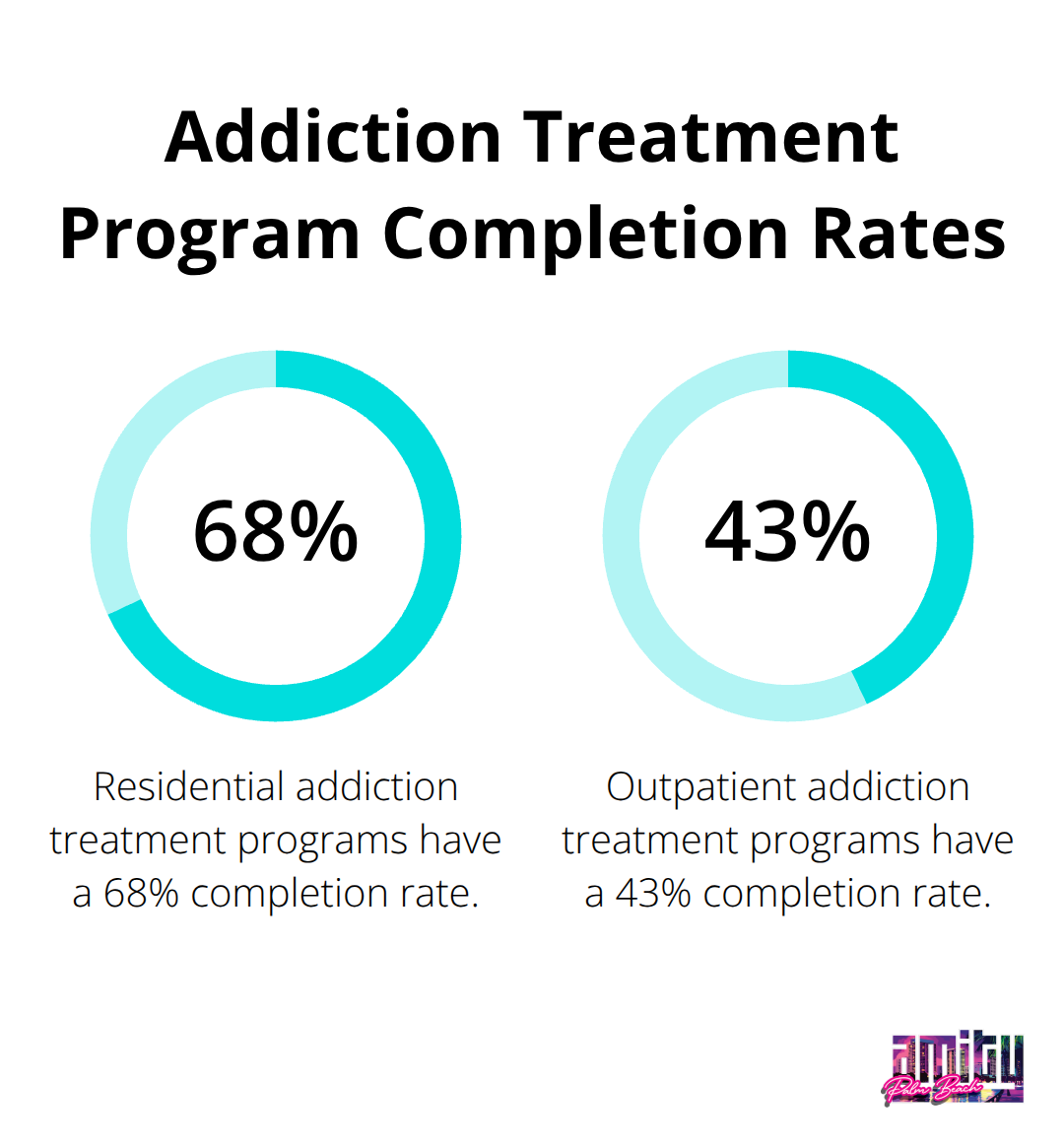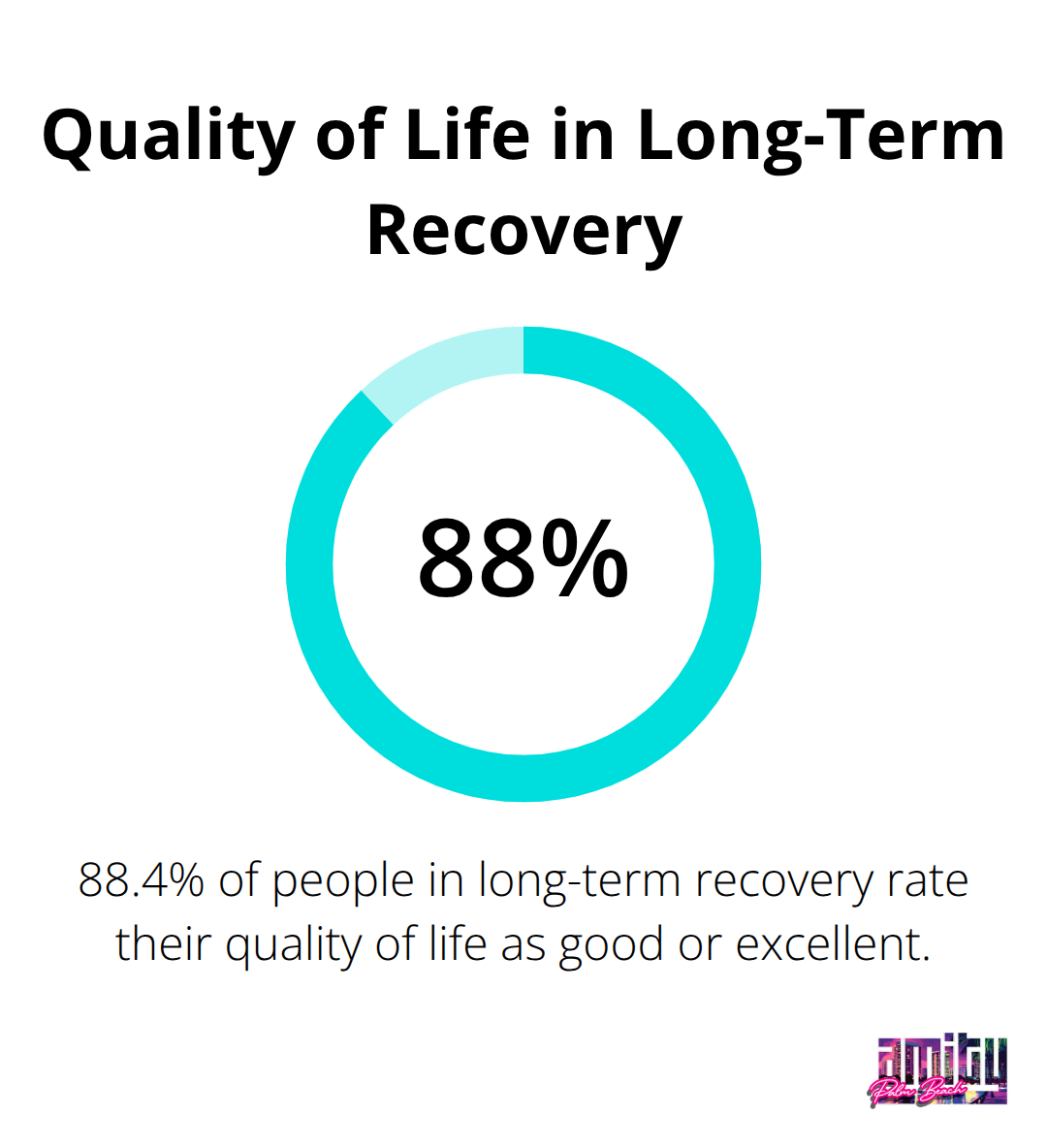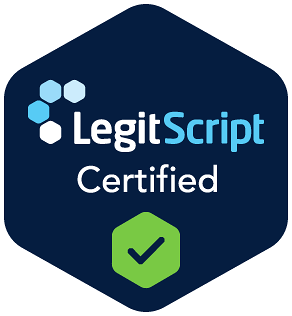Addiction affects over 21 million Americans, yet only 10% receive professional treatment. The path to recovery requires more than willpower-it demands evidence-based medical intervention and comprehensive support.
At Amity Palm Beach, we understand that successful addiction recovery depends on personalized treatment approaches that address both physical dependence and underlying mental health conditions.
What Makes Recovery Treatment Actually Work?
The Medical Reality of Addiction
Addiction operates as a chronic brain disease that fundamentally alters neurotransmitter pathways and decision-making processes. The National Institute on Drug Abuse confirms that substance use disorders require medical intervention just like diabetes or heart disease. This medical reality means self-detox attempts often result in dangerous complications (including seizures and cardiac events).
Why Personalized Treatment Protocols Matter
Successful recovery demands individualized treatment protocols based on comprehensive medical and psychological assessments. The Substance Abuse and Mental Health Services Administration reports that personalized treatment programs can reduce substance abuse by 40% to 60% compared to generic approaches. Rehab centers conduct thorough evaluations that examine addiction severity, mental health conditions, medical history, and social circumstances to create targeted treatment plans.

The Role of Medical Supervision
Medical supervision throughout detoxification and early recovery prevents life-threatening withdrawal symptoms while evidence-based therapies like cognitive behavioral therapy and dialectical behavior therapy address underlying psychological triggers. Research from the Journal of Substance Abuse Treatment shows that medically supervised programs significantly reduce relapse rates compared to unsupervised attempts.
Professional Treatment Teams Make the Difference
Professional treatment teams (including board-certified physicians, licensed therapists, and addiction specialists) provide 24/7 monitoring and adjust medications as needed to manage cravings and co-occurring disorders. These multidisciplinary teams work together to address both the physical and psychological aspects of addiction recovery.
The foundation of effective treatment extends beyond medical intervention to encompass comprehensive program components that address every aspect of recovery.
What Treatment Components Actually Work?
Medical Detox Prevents Life-Threatening Complications
Medical detoxification serves as the mandatory first step for most substance dependencies and requires 24/7 physician supervision to prevent life-threatening complications like seizures, cardiac events, and delirium tremens. Professional detox programs use FDA-approved medications (like buprenorphine for opioids and benzodiazepines for alcohol) to manage withdrawal symptoms while physicians monitor vital signs continuously. This medical foundation creates the therapeutic alliance that research shows is an important predictor of treatment outcomes for people who use alcohol and other drugs.
Residential Programs Deliver Superior Outcomes
Residential addiction treatment programs provide structured 24/7 support with completion rates that reach 68% compared to 43% for outpatient programs according to SAMHSA data. These programs combine daily individual therapy sessions, group counseling, and medical monitoring in controlled environments that eliminate access to substances and triggers. Intensive outpatient programs work effectively for individuals with strong support systems and stable housing, as they offer 9-20 hours of weekly therapy while participants maintain work and family responsibilities.

Co-Occurring Mental Health Treatment Changes Everything
Treatment that addresses co-occurring mental health conditions simultaneously with substance use disorders increases success rates from 35% to 67% according to the National Institute of Mental Health. Over 55% of individuals with addiction also struggle with depression, anxiety, or trauma-related disorders that require integrated treatment approaches. Licensed dual-diagnosis specialists use evidence-based therapies like Cognitive Behavioral Therapy and Dialectical Behavior Therapy to treat both conditions together rather than separately, which prevents the cycle where untreated mental health symptoms trigger substance use relapse.
These comprehensive treatment components create the foundation for sustained recovery, but success depends equally on what happens after formal treatment ends. For those seeking professional help, quality addiction treatment programs integrate these evidence-based approaches.
What Happens After Treatment Ends
Life Skills Training Creates Real-World Success
Recovery success depends on practical skills that most treatment programs overlook. The Recovery Research Institute found that 88.4% of people in long-term recovery rate their quality of life as good or excellent, but this achievement requires specific competencies. Effective programs teach financial management through budgeting workshops, job interview preparation, and conflict resolution techniques that prevent stress-induced relapse. Research shows individuals who master these fundamentals maintain sobriety longer than those who skip this training.

Support Networks Determine Long-Term Outcomes
Professional aftercare planning starts during treatment, not after discharge. The National Institute on Drug Abuse reports that individuals who engage with peer recovery coaches show positive effects in reducing substance abuse and improving treatment outcomes. Successful programs connect clients with alumni networks, sponsor relationships, and family therapy sessions that repair damaged relationships.
Sober Living Environments Provide Structure
Sober living homes demonstrate measurable benefits with residents showing higher employment rates and lower incarceration rates after 18 months. These structured environments bridge the gap between intensive treatment and independent living while maintaining accountability through house rules and peer support systems.
Ongoing Therapy Prevents Relapse
Weekly therapy sessions combined with daily check-ins through recovery apps create accountability structures that research proves reduce relapse risk over time. Licensed therapists help individuals navigate real-world challenges while maintaining the coping strategies learned during treatment. Cognitive Behavioral Therapy reduces relapse rates even after treatment ends, providing essential tools for long-term success.
Holistic Practices Support Mental Wellness
Holistic therapies like yoga and meditation provide stress management tools that complement traditional therapy approaches. These practices complement traditional therapy by addressing physical tension and emotional regulation that contribute to sustained recovery success. Aftercare is essential for maintaining long-term sobriety and should include comprehensive wellness approaches.
Final Thoughts
Successful addiction recovery demands professional medical intervention, personalized treatment approaches, and comprehensive aftercare plans. Evidence demonstrates that individuals who receive medically supervised detox, residential treatment, and co-occurring mental health care achieve significantly higher success rates than those who attempt recovery alone. The statistics speak clearly: proper medical supervision and individualized protocols make the difference between temporary sobriety and lasting transformation.
Recovery extends far beyond initial treatment completion and requires active participation in ongoing support systems. Practical life skills, strong support networks, and continued therapy sessions create the foundation for sustained sobriety. The 88.4% of people in long-term recovery who report excellent quality of life prove that comprehensive care produces measurable, lasting results.
We at Amity Palm Beach provide evidence-based medical treatment with personalized, whole-person care that addresses addiction and mental health simultaneously. Our team offers medically supervised detox, residential programs, and dual diagnosis treatment designed to heal body, mind, and spirit. The first step toward addiction treatment requires courage, but recovery remains possible for everyone who commits to comprehensive care.




